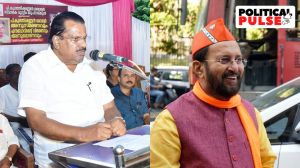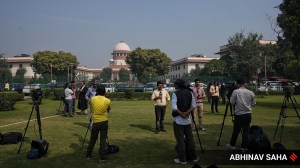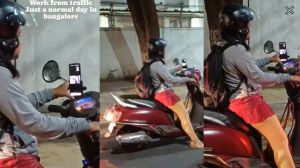- India
- International
Bring your own pens, no hand shakes: How countries went to polls in the ‘new normal’
Globally, elections have been postponed in at least 55 countries and territories between February and May, 2020. Even in cases where the elections were held, the dates had to be changed multiple times.
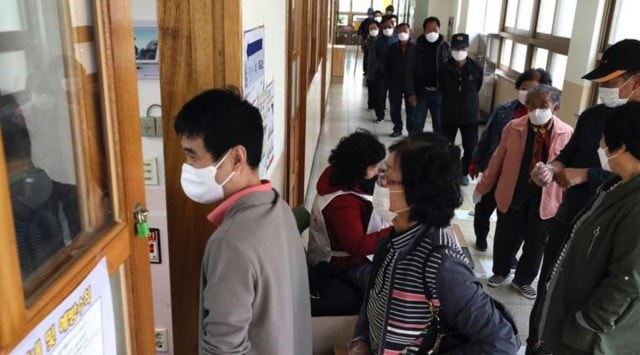 People wearing face masks to help protect against the spread of coronavirus, wait in line to cast for their votes for the parliamentary elections at a polling station in Nonsan, South Korea. (AP)
People wearing face masks to help protect against the spread of coronavirus, wait in line to cast for their votes for the parliamentary elections at a polling station in Nonsan, South Korea. (AP)Due to the Covid-19 pandemic, 30 countries postponed 12 national and 20 subnational elections scheduled between March-May according to an analysis done by Democratic Audit UK. Reversing it, countries like Singapore and South Korea not only conducted elections but experienced exceptionally good turnouts. It also resulted in countries like Poland opting for an unprecedented all-mail voting.
Conducting elections amid a global pandemic gives us a window to discern how governments are able to conduct a critical large scale event in such times and overcome the difficulties that come with it. In times when people’s basic rights such as freedom of movement are restricted, how do the authorities make special arrangements to ensure everyone gets an opportunity to exercise their right to vote albeit mitigating health risks. With more than 70 national elections scheduled for the rest of the year it is important to analyse how some elections unfolded during Covid-19.
Across the globe, elections have been postponed in at least 55 countries and territories between February and May, 2020. Even in cases where the elections were held, the dates had to be changed multiple times.
How did campaigning happen?
This year, the usual huge crowds and outdoor public gatherings of campaigns have made way for facebook lives, zoom addresses and online campaigning. There has been the rare public meeting, that too with a limit on the number of people were allowed to take place. Even as the campaigning was moulded on the basis of social distancing, issues hovered around the ongoing pandemic.
The candidates contesting in Singapore had to adhere to special protocols. Mass rallies were banned, strict social distancing rules had to be followed and meetings were capped at five people. “Fist bumping” and “shaking hands” were discouraged too.

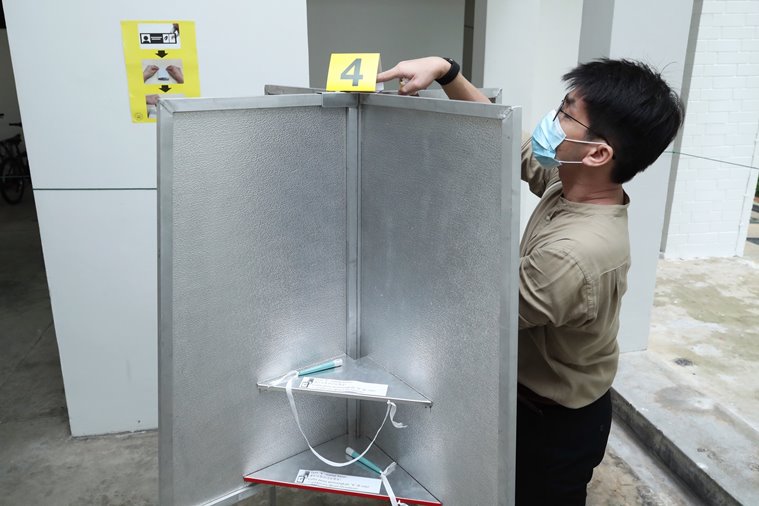 An election official places a number on top of a voting station at Bukit Panjang Ring Road Thursday, July 9, 2020, in Singapore. (Singapore Ministry of Communications and Information via AP)
An election official places a number on top of a voting station at Bukit Panjang Ring Road Thursday, July 9, 2020, in Singapore. (Singapore Ministry of Communications and Information via AP)
Some opposition parties in Singapore held weekly zoom meetings in which they interacted with their audience. Progress Singapore Party (PSP) showcased their fliers, and discussed their agendas in their weekly zoom meetup sessions.
How effectively did the incumbent governments handle the pandemic, the success of lockdowns measures and the country’s covid graph were some issues that were repeatedly raised by ruling and opposition parties contesting in the elections.
The public debate too focused on the current health issues and crisis, therefore reducing the wider political, social and economic discussions.
Voting amid the pandemic
Despite all the contaminants and movement restrictions before the election, people eventually had to come out of their homes to cast their votes on the election day. Therefore authorities diversified methods to vote and included special “hygiene protocols” to eliminate the threat of infection.
In most cases, authorities introduced mandatory face coverings for voters and a designated distance while waiting in lines to vote. Hand sanitizers dotted polling stations and disposable gloves were placed in front of ballot boxes.
In South Korea, over 5 lakh officials were deployed to disinfect more than 14,000 polling stations in the country. A distance of 1 meter had to be maintained by all voters. Similarly, voters had to stand 2 meters apart in Singapore which conducted temperature screenings and took contact details of all voters to be used for contact tracing in case of any infections.
In Serbia, every polling station was equipped with face masks and hand sanitisers. Poland asked its voters to bring their own pens and kept the doors of polling stations open to decrease the surfaces of contact. The polling stations aired once every hour for 10 mins.
As voting took place while coronavirus restrictions were still in place, countries like North Macedonia kept the polling stations open till late evening to encourage greater turnout. Similarly, in Dominican Republic, the covid restrictions were eased so that people could get outdoors and vote. Voting time in Singapore was extended from 8 pm to 10 pm as relatively less number of stations were seeing long queues.
Special arrangements were made for the elderly in all cases. A special time bandwidth was set aside for voters above the age of 65 in Singapore.
Voting for Covid positive/quarantined individuals
A big question that daunted countries conducting elections were if Covid-19 positive individuals should be allowed to vote? And if yes what can be done to ensure the safety of others voting. In South Korea any voter who had a temperature above 37.5 degrees celsius was taken to a separate booth away from the common areas. These isolated voting boxes were usually kept outdoors, near the main polling station.
Patients who had tested positive for the coronavirus were given the option of mailing their ballots. Korean authorities had set up strict protocols for quarantined people allowing them to cast their vote only at a designated time period in special locations. Quarantined voters could step outdoors from 5:20 pm to 7 pm on the election day and were forbidden to use any form of public transport. It was mandatory for these voters to inform the health officials that they have reached their homes.
Singapore on the other hand did not allow people with coronavirus or under quarantine to vote. However, mobile polling teams brought ballot boxes to the doorsteps of people who had returned from abroad and were kept under the mandatory 14-day quarantine.
Postal voting
The arrangements of postal or in mail voting were brought in place in a few cases to avoid crowdings outdoors. South Koreans were given an option to vote through posts, but most people choose to visit the polling booths.
 Citizens of Belarus in Poland line up to vote in an election taking place in their country, in Warsaw, Poland, Sunday, Aug. 9, 2020. (AP)
Citizens of Belarus in Poland line up to vote in an election taking place in their country, in Warsaw, Poland, Sunday, Aug. 9, 2020. (AP)
Poland however chose to conduct its election exclusively through postal voting, becoming the first country in the world to do so. Poland’s postal service was given the task of distributing ballots seven days before the elections were scheduled to take place. On the election day, voters had to deposit ballots in special collection boxes.
Critics say a total reliance on the postal system, especially with no prior experience and limited time remaining before the elections, could hamper a free and fair election. Poland’s National Election Commission expressed doubts about the hastiness of conducting polls through a completely new method. Moreover, the crowding was reported even at the collection boxes, so the aim behind eliminating physical voting was not fully accomplished in the country.
A case for online voting?
Although it hasn’t been fully implemented in any case till now, research published by the International Institute for Democracy and Electoral Assistance (International IDEA) said “online voting has never faced a situation as favourable as today. Implementing online voting can be a challenging task as it requires fundamental changes as to how an election is conducted.
In terms of difficulties, one might argue online voting does not provide equal opportunities in countries that have low internet connectivity. Other issues that surface online including hacking, fake sites can compromise authenticity in voting.
On the other side, online voting can work effectively with the safety measures required during the coronavirus and minimise the risks of getting exposed to the virus. It eliminates the process of “going out” and compliments “lockdown measures” in place during the time.
In comparison to postal voting, online voting considerably reduces logistical issues like manually counting votes in “possible crowded centres”. It reduces the number of people involved in mailing out ballots and collecting them, etc. With the exception of Estonia, which was the world’s first country to conduct its parliamentary elections through “e-voting”, the expected boom in online voting hasn’t taken place till now and pandemic might provide new opportunities for the process to be implemented.
Apr 26: Latest News
- 01
- 02
- 03
- 04
- 05

















